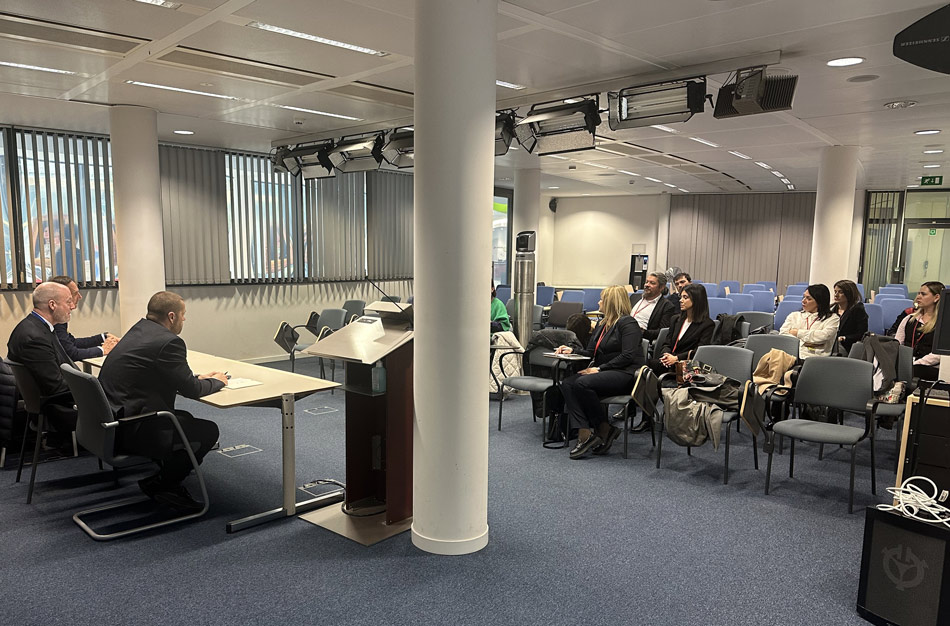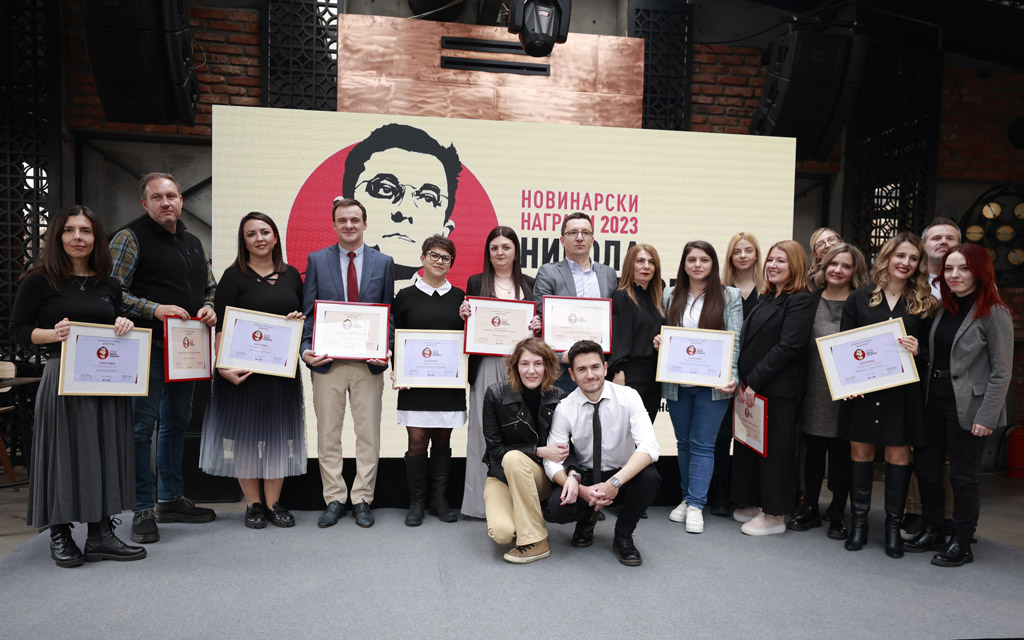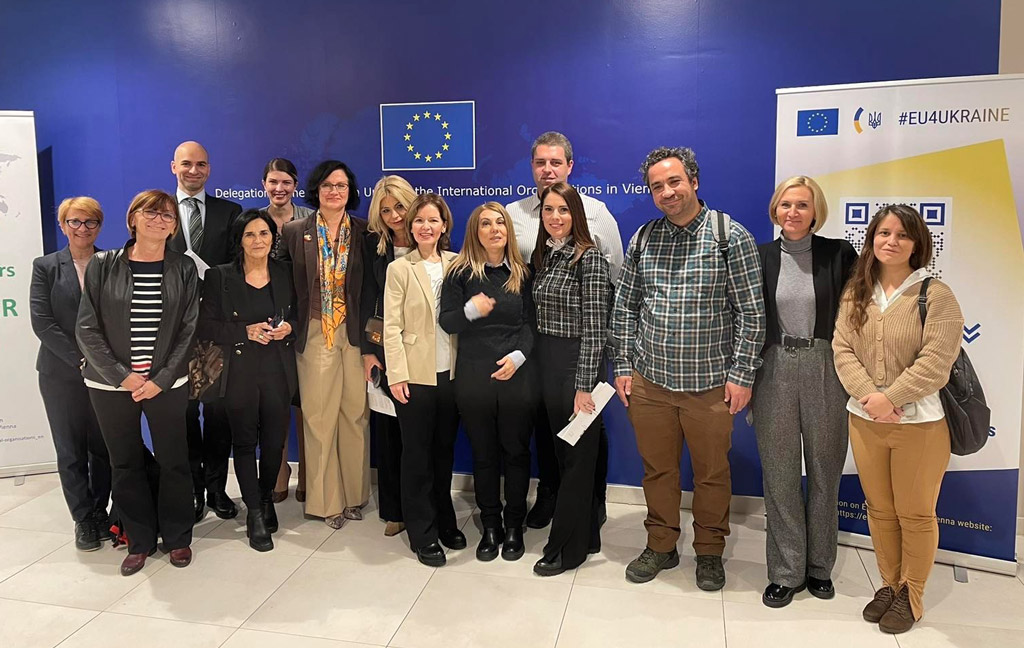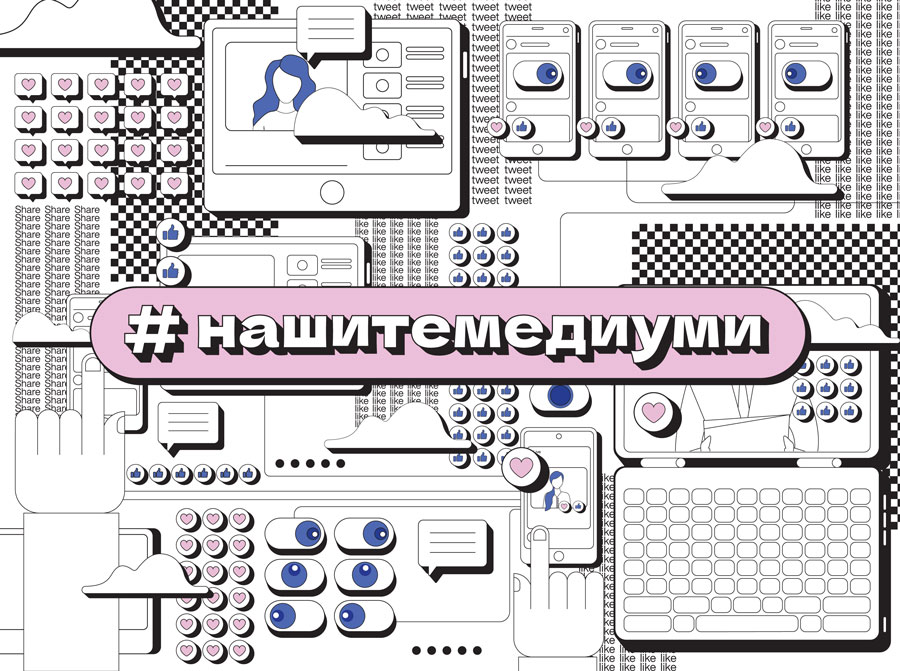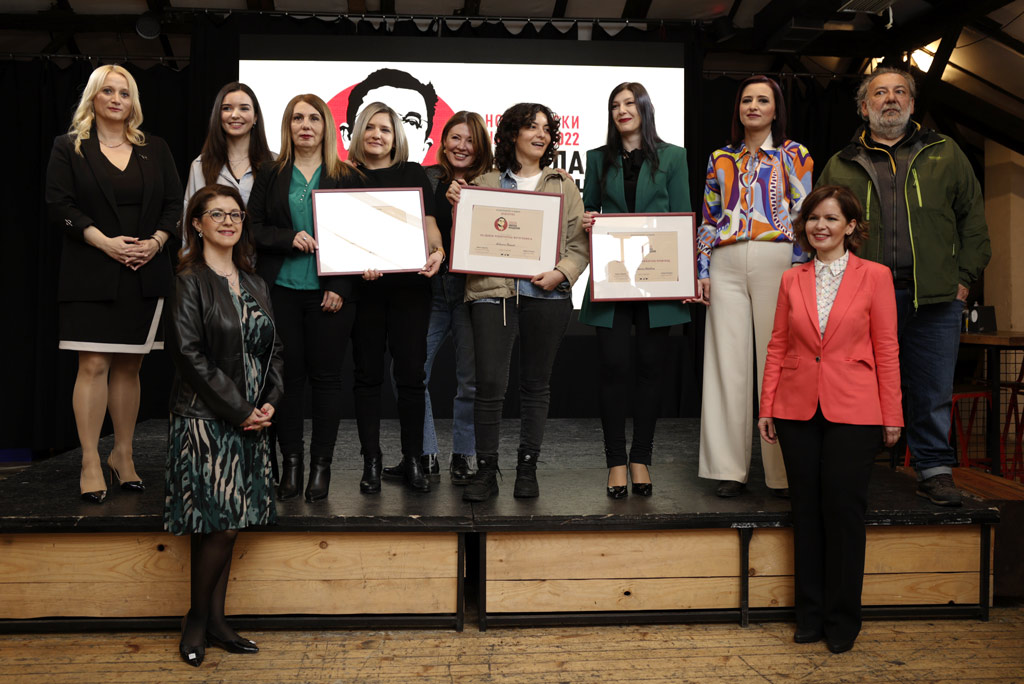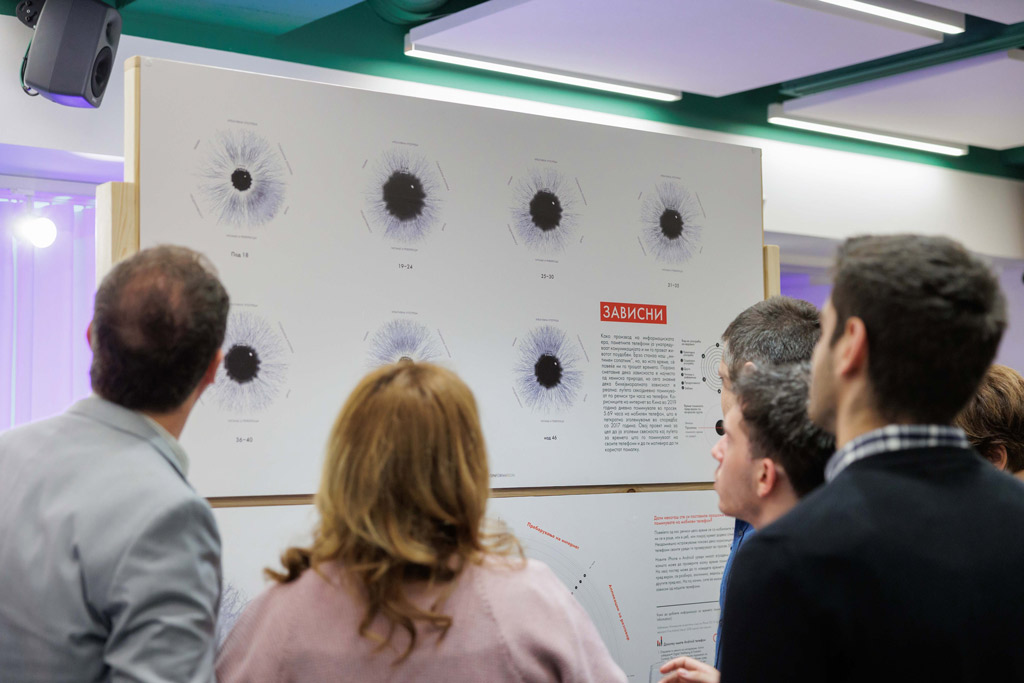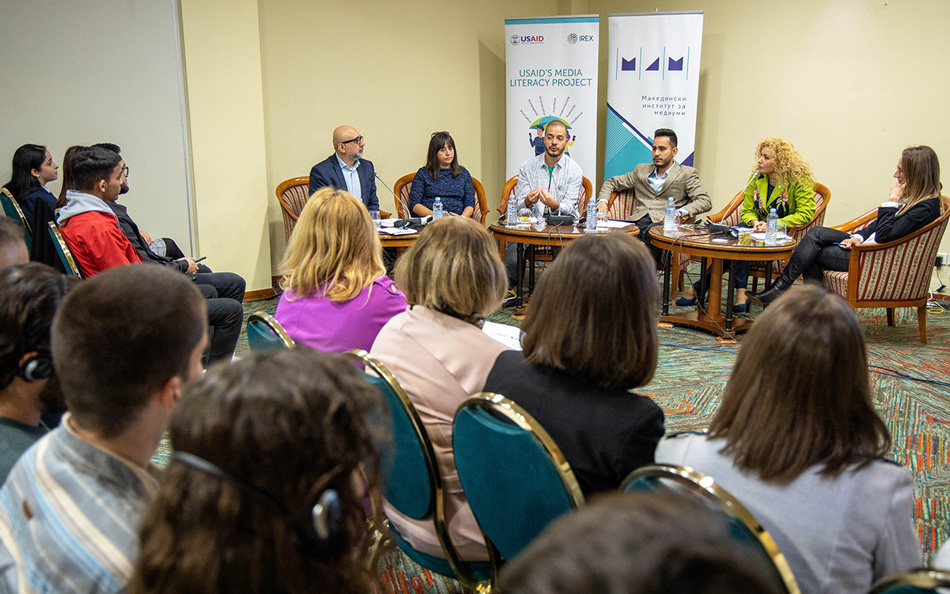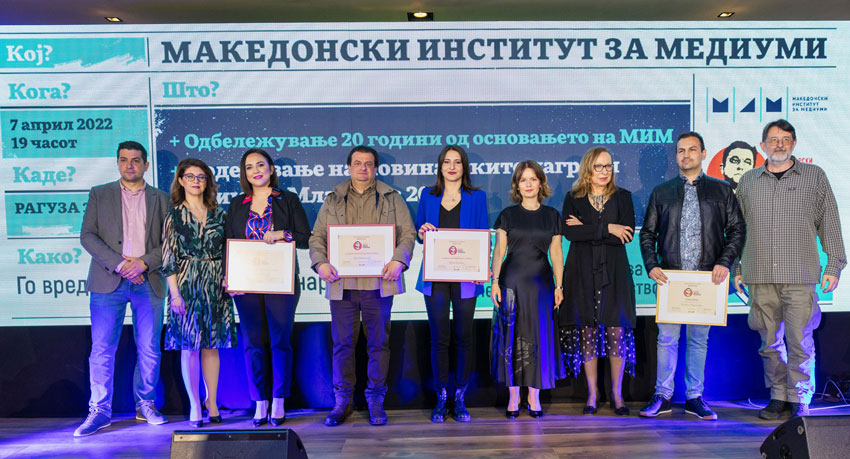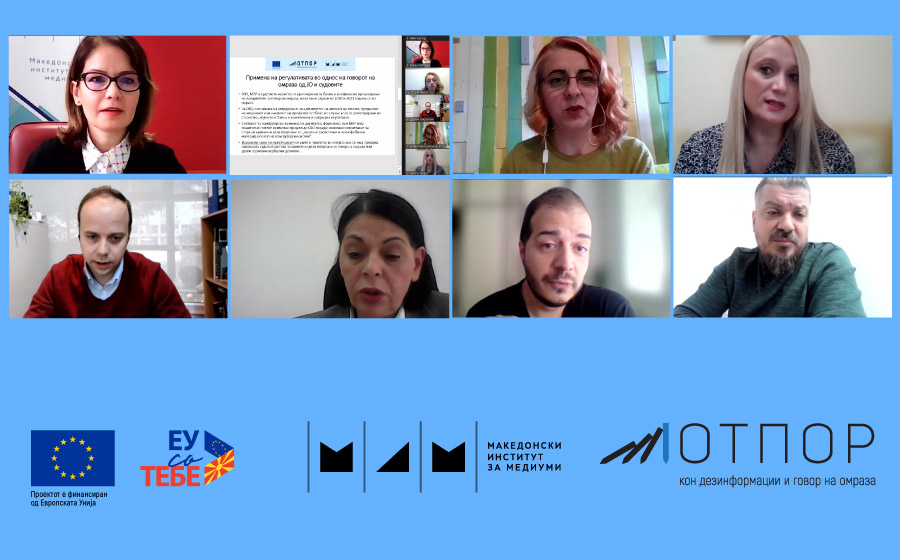Journalists, editors and representatives of civil society organisations were part of the study visit to Brussels organised by the Delegation of the European Union in Skopje and the Macedonian Institute for Media in the period 20-23 March.
The study visit was designed as an interactive event to share experiences and knowledge regarding EU policies for tackling information manipulation and external influences - FIMI (Foreign Information Manipulation and Interference - FIMI), including disinformation regarding EU enlargement policies with a focus on the situation in North Macedonia and the negotiation process.
During the visit, the participants had the opportunity to learn more about EU policies for tackling manipulation of information and external influences against different social groups and reform initiatives, during and before the upcoming elections, as well as the role of the media in tackling FIMI and disinformation.
The visit included working sessions with representatives of the European External Action Service, including the Western Balkans StratCom Working Group and Commission directorates (DG NEAR and CNECT).
In conversations with representatives of the European Parliamentary Forum, journalists and representatives of civil society organisations learned more about the financiers of religious extremists against human rights related to sexuality and reproductive health in Europe.
During a visit to the European Federation of Journalists (EFJ), Ricardo Gutiérrez General Secretary presented the organisation’s work and the assistance they provide to journalists facing threats and pressures. At the meeting there was also a discussion about tackling disinformation in the media, as well as the role of ethical and professional journalism in the fight against this negative phenomenon.
The journalists in Brussels also met with the EU Ambassador in North Macedonia, David Geer, who was informed about the course of the visit and the importance of such visits for journalists and representatives of the civil sector.
News
At the annual "Nikola Mladenov 2023" journalism awards competition, the journalist Aleksandar Dimitrievski was awarded the first prize for the Best Investigative Story for the story "From an underwear company to granted oversight of a EUR 1.3 billion project with outsourced experts", which was broadcast on the show "360 Stepeni".
The series of texts and supporting videos by the author Dimitrievski reveal serious irregularities in the tender procedure for the selection of oversight body over the largest and most expensive infrastructure project in the history of the country - construction of highways by the Bechtel-Enka Consortium. By disclosing the intention for rigging the tender for oversight, which should be deemed as the only existing control level over the "secret" construction of corridors 8 and 10 and the spending of EUR 1.3 billion of public money, the journalist showed an exceptional journalistic engagement, thoroughness and systematic approach in analysis and verification of a large number of documents and data related to the contested tend.
The second award for Best Research Story was awarded to the journalist Irena Mulacka for the series of articles related to the events at the Oncology Clinic, published in the weekly magazine "Focus".
Through these series of texts, the author Mulacka publishes startling data about serious omissions and malpractices in the treatment of patients at the Clinic for Oncology and Radiotherapy. The series of stories expose in full capacity the illegal, unethical and corrupt actions of certain employees of the Clinic, which raises the social alarm and the pressure on the competent institutions to take more decisive steps for prevention of the above actions.
Journalist Martin Pushevski is the winner of the third prize for Best investigative story for the series of texts about the struggle of the citizens of the Strumica Valley against the opening of the " Ilovica" mine, published on the "Doma" web portal.
The series of articles on "Ilovica" reveals the ways in which the mine came a step closer to obtaining work permits, despite the concerns and reactions of citizens and the professional public about the damage that can be caused to the environment in the Strumica Valley.
The team of journalists consisted of Sashka Cvetkovska, Elena Mitrevska Cuckovska, Maja Jovanovska and Ivana Nasteska from the editorial office of the Investigative Reporter’s Laboratory received the award for the Most Innovative Journalistic Product for the investigative documentary "Murder in Tetovo", broadcast on MTV1 and on the IRL website.
The investigative documentary film "Murder in Tetovo" redefines journalistic storytelling. It presents in an innovative way the facts and arguments arising from the months-long investigation led by journalists on the causes for one of the biggest accidents in Macedonia, the fire in the modular covid hospital in Tetovo, in which 14 lives were lost.
Photojournalist Tomislav Georgiev won the award for the Best Reporter's Photo for the photo "Church", published in the online edition of the weekly magazine "Focus".
Commendations for outstanding journalistic engagement in the Best investigative story category were awarded to journalists Mirjana Mirchevska Jovanović, Slavica Filipovska Ivanova and Jasmina Jakimova. The "Vidi Vaka" editorial office and journalist Katerina Topalova were awarded commendations for outstanding journalistic engagement in the category Most Innovative Journalistic Product.
This year's competition, announced on January 31 and closed on February 26, 2024, received numerous applications, as follows:
39 stories covered in 175 texts/supporting videos for the Best Research Story category
15 topics covered in 16 texts/supporting videos for the category Most Innovative Journalistic Product
21 photos for the Best Reporter Photo category.
The awards for the best investigative story have been traditionally awarded by MIM since 2001. As of 2013, the award bears the name of the well-known respected journalist and owner of the weekly magazine "Focus", Nikola Mladenov.
The report of the Commission is attached hereto.
Photo gallery of the event is available here
COMMISSION’S REPORT ON AWARDING THE JOURNALISM AWARDS "NIKOLA MLADENOV 2023"804.21 KB
Journalists from several national media in the country were part of the study visit to Vienna, organised by the Delegation of the EU and the Macedonian Institute for Media (MIM) in the period 21-23 November. The visit was organised in the context of the Macedonian Chairpersonship of the OSCE in order to better familiarise the journalists with aspects of the co-operation between the EU and the OSCE, including topics related to the activities of the OSCE on media freedom, the spread of disinformation as a security threat, manipulation of information, elements of external influences in the region and hybrid threats. They also discussed the expectations from the upcoming 30th Ministerial Council of the OSCE in Skopje and the effects of the decisions that should be made, as well as a series of current issues related to the European integration process of our country.
Journalists had the opportunity to meet and talk with relevant representatives of several governmental, intergovernmental and international media organisations based in Vienna. Extremely useful and productive discussions were held at the meetings with the ambassador at the Permanent Representation of the EU to the OSCE, Rasa Ostrauskaite, and the Head of Mission at the Permanent Mission of North Macedonia to the OSCE Igor Djundev and his team. In a conversation with the Minister of Foreign Affairs of Austria, Alexander Schallenberg and other senior representatives of the ministry, the importance of fulfilling the agreed obligations of the country in order to successfully continue the European integration process was emphasised, and other current issues in the domain of the regional and international politics were also discussed.
The team of journalists from North Macedonia also had a meeting with the OSCE Representative on Freedom of the Media, Teresa Ribeiro, who was informed about the current developments that infringe the principles of media freedom in the country, as well as about the challenges the sector is facing.
At the meeting with the International Press Institute (IPI), director Frane Maroevic and his team informed the journalists about their activities in the region and beyond, as well as the assistance they provide to journalists facing threats and pressures.
The visit to the Austrian Public Broadcaster - ORF was an excellent opportunity for journalists to familiarise themselves with the standards and working conditions in this organisation, which is a leading media and a highly relevant source of information for Austrian citizens.
The primary focus of the three-year project Our Media is on strengthening the capacities of CSOs, media professionals, young activists and citizens to improve their understanding of trends and challenges regarding media freedom and media integrity as well as media development and sustainability in the Western Balkans and Turkey.
Our Media is being implemented with the financial support of the European Union, in Albania, Bosnia and Herzegovina, Kosovo, Montenegro, North Macedonia, Serbia and Turkey, by partner organizations SEENPM, Albanian Media Institute, Mediacentar Sarajevo, Press Council of Kosovo, Montenegrin Media Institute, Macedonian Institute for Media, Novi Sad School of Journalism, Peace Institute and Bianet.
The project opens with research activities that will seek to identify the main trends, risks and opportunities for media sustainability in the region, and map good practices in media activism in support of media freedom and media and information literacy (MIL). The research findings will be used to strengthen capacities of media CSOs and other stakeholders for addressing challenges in media sector.
Professional capacity of journalists, media outlets and media institutions will be addressed through targeted advocacy activities and engagement in national MIL coalitions. Through media activism, local and national media and other actors will be challenged to address gender inequalities in the media. Young leaders will be empowered to challenge harmful policies and practices, counter discrimination and gender stereotypes, and promote gender equality through their future work. Through financial support to CSOs in urban and rural areas, the project will reach out to local communities with a view to advancing MIL skills of citizens, promoting media freedom and integrity and countering polarisation that stems from propaganda, hate speech and disinformation.
The Project in Numbers
200 CSO representatives will be directly empowered to generate effective MIL practices and at least 18 CSOs in urban and rural areas in six countries will be supported to reach out locally and create MIL actions.
70 media professionals and representatives of self-regulatory bodies will learn about the state of self-regulation in their countries and the WB region, and how to advance codes of ethics and self-regulation standards/practices.
15.000 young people will take part in and learn through interactive MIL quizzes; at least 500 will be empowered in national MIL coalition actions.
21 young people (activists, youth workers, educators, journalists, young politicians) will improve competence for media literacy and activism, including topics like media freedom and integrity, political economy of media, media ecology, digital participation.
Funded by the European Union
The regional program “Our Media: A civil society action to generate media literacy and activism, counter polarisation and promote dialogue” is implemented with the financial support of the European Union by partner organizations SEENPM, Albanian Media Institute, Mediacentar Sarajevo, Press Council of Kosovo, Montenegrin Media Institute, Macedonian Institute for Media, Novi Sad School of Journalism, Peace Institute and Bianet.
This article was produced with the financial support of the European Union. Its contents are the sole responsibility of SEENPM and do not necessarily reflect the views of the European Union.
The team of journalists Sashka Cvetkovska, Elena Mitrevska Cuckovska, and Maja Jovanovska, from the Investigative Reporting laboratory (IRL), won the award for Best Investigative Story at this year’s Nikola Mladenov Journalism Awards 2022, for the story Dirty Blood, published on the National Public Broadcaster MTV 1 and on the website of IRL.
The story discloses worrying data on how patients were treated in one of the private hospitals in the country during the covid-19 pandemic. The journalistic product contains thorough journalistic research supported by facts, evidence, and statements from many relevant sources and interviewees. The problem is explained in an understandable way, according to professional and ethical journalistic standards, as well as with a commitment to initiate institutional resolve of detected irregularities. The story, which set off an avalanche of reactions in the public, is an example of consistent monitoring of a problem of high public interest, with strong journalistic and team engagement.
The journalist Kristina Atovska received the award for Most Innovative Journalistic Product for her report on the war in Ukraine titled Life on the Front Line Trenches broadcasted on the Morning Briefing show on Slobodna TV.
The story shows the life of Ukrainian citizens, including children with disabilities, the problems they face and the support they receive from humanitarian organizations and individuals during the war in the country. Using only her mobile phone, without any additional resources or the ability to report with the support of a complete journalistic team, the author allowed the audience to hear, in an authentic and creative way, the voice of those who were on the front lines and those most vulnerable, trying to send an appeal for solidarity and support not only to the domestic, but also to the global public.
The Best Photojournalism Award was presented to the photo-reporter Arbnora Memeti for the photo “Rainfall” from Carcinogenic Substances in Tetovo, published on the website of Deutsche Welle in Macedonian.
Demonstrating exceptional creativity and esthetic expression, the photo clearly and precisely illustrates the problem with extremely polluted air in Tetovo during last year's fire at the Tobacco Factory. Capturing the drama of the setting, the photo grasps the viewer and sends a clear message about the gravity of the problem and its consequences.
This year’s competition included:
16 stories, processed within 77 texts and video stories, in the category Best Investigative Story;
18 topics in the category Most Innovative Journalistic Product;
27 photos in the category Best Reporting Photography/Best Photojournalism;
The awards for best investigative journalism stories have been awarded by MIM traditionally since 2001. The awards were named Nikola Mladenov in 2013, after the renowned journalist and owner of the Fokus weekly. In 2021, two more special categories were introduced - Most Innovative Journalistic Product and Best Photojournalism.
Photo gallery from the event is available here.
The Head of the Delegation of the European Union, David Geer opened the Glass Room: Misinformation Edition exhibition at the Europe House Skopje last night. The exhibition is a new eye-catching, self-learning installation, consisting of series of posters, interactive apps and animations, which can be hosted in public or private spaces and visited online. The event was co-organised by the Delegation of the European Union and the Macedonian Institute for Media.
The exhibition offers visitors an opportunity to learn more about misinformation and the role of internet users in spreading them, as well as business models, designer tactics and user behaviour that contribute to enabling environment for their dissemination. Within the exhibition there is also Data Detox Kit, including a section on misinformation, containing concrete steps how to use technology in a smart and responsible way.
In addition to the exhibition, there will be several interactive workshops for adults and young people, which will include themes related to the Data Detox Kit. The installation in Skopje will be open to visitors in the next three months. In the course of 2023 it will be hosted by the Europe Houses in Kriva Palanka and Strumica.
The exhibition has been developed and curated by Tactical Tech, a Berlin-based international NGO, in collaboration with several European partners and co-funded by the European Union. Since its launch in 2020, the Misinformation Edition has been hosted in 19 countries in Europe, in diverse locations, such as libraries, schools, shop fronts, train stations and is available in more than fifteen languages. The installation has been visited by more than 30,000 in-person guests across Europe, and has reached hundreds of thousands more online.
The exhibition was the closing event of the Media Literacy Days 2022, organized by the Media Literacy Network. In this way, our country joins UNESCO's Global Media and Information Literacy Week for the fourth year in a row.
Detailed information and exhibition credits are available on this link.
How the educational system and the media can contribute to dealing with the stereotypes and prejudices - this was the main topic of the panel-discussion "Through media literacy, we educate young generations without prejudices and stereotypes", organized by the Macedonian Institute for Media and IREX.
Attending teachers, journalists and activists shared their experiences in work with students and young people who face stereotypes on different bases, both, in reality and online. The teachers, professors and civic activists talked about the mechanisms within the educational systems, while the journalists expressed the role of the media and the media literacy in tackling these phenomena.
Most of the attending students stressed the importance of media literacy for personal and professional development of young people, which is particularly significant for the new media reality that we live, as well as for building cohesion in our multiethnic society. Both, the panelists and attended guests emphasized the need of introduction of the media literacy in formal and nonformal education, as one of the ways to deal with these negative phenomena.
This event is part of the USAID's Media Literacy Project “YouThink”, and it was organized within the Media Literacy Days 2022.
Journalist Irena Karevska won the award for Best Investigative Story at this year’s competition for the Nikola Mladenov journalism awards for 2021, for investigating the case of procurement of software for automatic issuing of traffic fines, which was procured by the former government Secretary General Dragi Rashkovski. The story was published in the 360 Degrees programme, on Alsat – M television.
In a series of 10 news stories prepared in a modern television product, the author crafts her way in leading the reader through the investigation process in which she continuously publishes new, scandalous information, demonstrating detailed journalistic investigation, supported with facts, evidence and statements from relevant sources and interlocutors. Thus, she uses simple, intelligible and original expressions, but also demonstrates boldness, decisiveness and persistence in the intention for the case to be processed institutionally, which is an important criterion in assessing the quality of the stories.
Certificate of Appreciation for outstanding journalistic engagement in the category Best Investigative Story was awarded to the journalist Vlatko Stojanovski for the series of texts on the topic “Offshore Companies”, published on the internet platform SCOOP Macedonia.
Within the series of three investigative stories, the author demonstrated detailed journalistic investigation, crafting the processing, categorisation, and analysis of all the legal subjects which, within their ownership structure have other companies registered in the so-called offshore zones, and it also reveals information for people related to them, or are behind the companies, for their actions and activities.
Journalist Katerina Topalova was presented with the award for Most Innovative Journalistic Product for the multimedia story “From a Party Cash Cow to a Golden Chicken”, published on the internet platform Just Ask.
Through this short, dynamic and creative journalistic story, the author in an original manner succeeds to present and address to the public, the problem with the million-worth sums which the state-owned company ESM regularly spends for renting mechanisation for digging coal and tailings pond. The innovative and creative approach in this journalistic analysis and mini-research of a theme which is of high public interest lies in the fact that it is told on a Green screen by using graphics and 3D animation.
The best photo-journalism award was presented to the photo-reporter Igor Banskoliev for the photo “The Hero from Deljadrovce,” published in the Nova Makedonija daily.
The photo captures a moment of fighting with the raging fires near the Skopje village of Deljadrovce, during the fires last year.
The “hero” on this photo, with a bucket of water, half-naked makes his way through the smoke, trying to extinguish the fire on the railway near Deljadrovce. The author Banskoliev through this photo, in a most picturesque manner presents the individual fighting with the raging fires, demonstrating creativity, extraordinary aesthetic expression and sense of composition.
This year competition included:
29 stories, processed within 88 texts and video stories, in the Best Investigative Story category;
13 stories in the Most Innovative Journalistic Product category;
15 photos in the Best Reporters Photo/ Best Photo-Journalism category;
The awards for best investigative journalist stories have been awarded by the MIM traditionally since 2001. The award was named “Nikola Mladenov” in 2013, after the renowned journalist and owner of the Fokus weekly.
Photo gallery from the event is available here.
Improving court practice and strengthening media self-regulation are key factors to fighting hate speech and disinformation in the public communication. This is one of the conclusions from the panel discussion “Effectiveness of the Legal and Self-Regulatory Mechanisms in Fighting Hate Speech and Disinformation in North Macedonia”, organised by the Macedonian Institute for Media (MIM).
Speakers at the panel discussion were representatives from regulatory and self-regulatory bodies, as well as members of the media community. They spoke about the current situation with hate speech and disinformation in the public discourse, particularly considering the trends that are set by the new media and social networks.
Opening the discussion, MIM presented the analysis "Regulatory and Self-Regulatory Framework Against Hate Speech and Disinformation in the Republic of North Macedonia” which presents a factsheet on the basic legal and self-regulatory mechanisms regarding these issues.
Emilija Petreska-Kamenjarova from the Agency for Audio and Audio-Visual Media Services, in her speech pointed that the regulatory body always acts against cases of hate speech in media in accordance with the rules defined in the Guidelines for Monitoring Hate Speech which transpose the practice of the European Court of Human Rights. “When you need to establish that particular media outlet is responsible for disseminating or supporting hate speech, you should take a measure to limit the freedom of expression and that has to be exceptionally well founded and evidence based decision. The initial step is to establish whether there is hate speech, because not everything we dislike in the public discourse is hate speech” said Petreska-Kamenjarova.
Media are responsible for regular review and prompt removal of user comments published under the journalistic content on the web pages or social networks, which contain hate speech and have the potential to cause damaging consequences in the society, considers Marina Tuneva, director of the Council on Media Ethics. “In no case should media allow to be misused and serve as tools for disseminating hate, calling for individuals to unite for radical actions and acts that disturb public peace and order in the society and other actions”, stated Tuneva.
In accordance with Article 10 from the Law on Prevention and Protection against Discrimination, the Commission treats hate speech as harassment, which has the aim to damage the dignity and integrity of the person, stated Vesna Bendevska, member and until recently president of the Commission. “The Commission so far has investigated 30 cases which pertain to harassing speech, that has always been based on some of the discriminatory grounds laid down in the Law” said Bendevska. She added that increased number of cases of hate speech have been noted during certain societal events, such as the Pride Parade, or during electoral campaigns, when hate speech targets the political beliefs.
Dragan Sekulovski, Executive Director of the Association of Journalists of Macedonia (AJM) underlined that although the country was lagging behind in court practice regarding hate speech, however, the recent first verdict for hate speech on Facebook, reached in favour of the AJM, is sign of hope that steadily there will be court practice for such deeds. “Last year the AJM in talks with the responsible judicial bodies, as well as with the Ministry of Justice, requested the establishment of separate unit within the Basic Public Prosecutor’s Office, composed of prosecutors that would be trained and possess the necessary expertise for deeds related to hate speech, as it is a matter of quite specific cases, particularly when it comes to verbal acts committed online” added Sekulovski.
This panel discussion was organized within Resilience: Civil Society for Media Free of Hate and Disinformation, a regional project financially supported by the European Union and implemented in the Western Balkans and Turkey by a consortium of media development organizations led by SEENPM. It is part of a series of publications on the same general topic researched in Albania, Bosnia and Herzegovina, Kosovo, Montenegro, North Macedonia, Serbia and Turkey (all publications are available on the SEENPM website).

